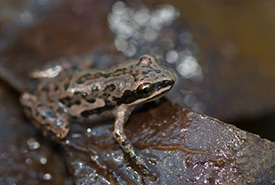Chelsea – Protecting a 24-hectare habitat for the western chorus frog

Western chorus frog (Photo by Josh Vandermeulen, Creative Commons)
The Western chorus frog, one of the smallest frogs in Quebec, can now count on a new refuge in the Outaouais region. A 24-hectare site, within the Breckenridge ecological corridor in Chelsea has recently been protected by the Nature Conservancy of Canada (NCC).
Ensuring better connectivity
One of the main causes of the western chorus frog’s decline is land fragmentation, caused in large part by increased urbanization. Since the frog’s habitat varies according to its stage of development, connectivity between its environments is crucial to its survival. Although it breeds in aquatic environments, this tree frog also frequents wetlands that dry out in summer, such as marshes, swamps and ditches, as well as clearings, wet meadows, low-intensity agricultural environments (e.g. hay crops or pastures) and wastelands. And that is why the Breckenridge ecological corridor, rich in aquatic environments and wetlands, is being protected. It is important to note that in Quebec, this species, with its unique song (in French), is found only in the Outaouais and Montérégie regions, which contributes to its rarity and vulnerable situation.
The Breckenridge ecological corridor
Essential to the conservation of biodiversity in the Outaouais region, the Breckenridge ecological corridor is a transition zone between different natural environments, such as forests, fields and waterways. Among other things, it enables wildlife to move freely and find the resources they need to survive. This corridor is home to many species of mammals, birds, reptiles, amphibians, fish, insects and plants.
Protecting biodiversity: A collective effort
The outstanding mobilization of Chelsea community members, supported by key financial partners, has made it possible to achieve a major milestone in biodiversity conservation. Thanks to this collective effort, NCC is now in a position to protect this area, which, in addition to the 300 hectares already protected by NCC in the area, will enable the consolidation of the Breckenridge ecological corridor. This success is a testimony to the positive impact that partnerships and concrete actions can have.
NCC would like to thank Mr. Poulin of the Devcore group and Mr. Clavet and anonymous citizens for their donations which, combined with public funding, have made it possible to protect this environment.









